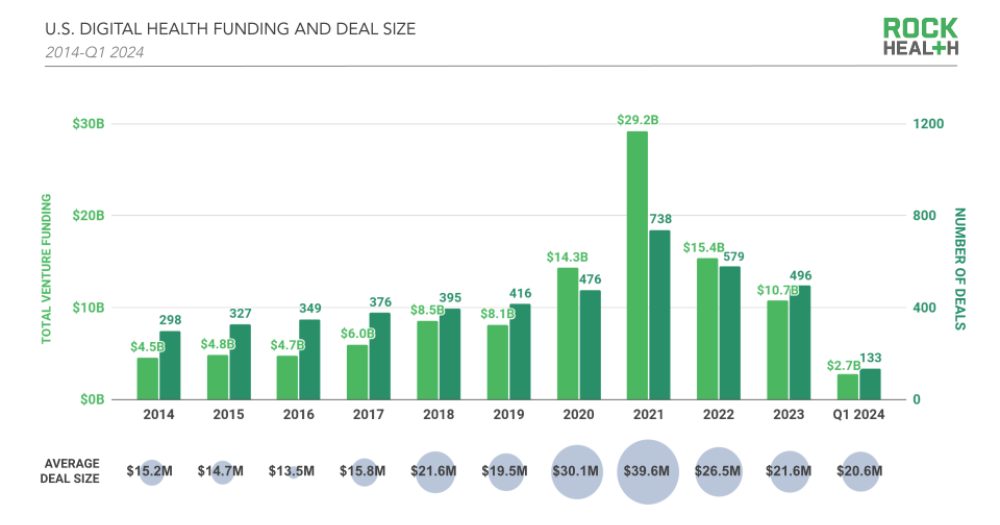Rock Health: US digital health companies raised $2.7B in Q1 2024

Rock Health is out with its quarterly report looking at digital health funding in the U.S. During Q1 2024, it has tracked 133 digital health deals worth $2.7 billion — with an average deal size of $20.6M.
In the private markets, creative financing measures were the name of the game, while AI drove investment energy and attention refocused on startups' abilities to demonstrate outcomes. In the public markets, stock delistings continued to change the makeup of digital health's publicly-traded cohort, impacting how digital health players and investors think about exit potential.
Highlights
Here are Rock Health's key findings:
- Q1 2024 was the lowest first quarter by sector funding since 2019, noteworthy given that Q1 was the top-funded quarter of the entire year in 2022 and 2023.
- 48% of the Q1's deals were unlabeled, compared to 44% of all digital health funding deals in 2023. These unlabeled rounds are often used to extend capital to companies that aren't ready to raise a new round.
- Founders are also exploring creative deal structures to lock in investor participation. For instance, medication management player DecisionRx secured $100M as a debt facility from investment firm Carlyle and as part of the investment - Carlyle received the option to acquire 25% of the outstanding equity of DecisionRx. Meanwhile, late-stage player Transcarent is structuring terms of their $125M Series D to offer funders 2.5x their investment should the company M&A or IPO.
- 40% of Q1's funding total went to AI-enabled companies ($1.1B across 45 deals), rising from 33% of 2023 digital health funding, and 29% of 2022's funding pot.
- In Q1, significant energy was aimed at assessing the outcomes of digital health solutions. From these conversations came some important takeaways. Crowded digital solution spaces are pushing enterprise buyers to seek out outcomes data as a way to differentiate players in the market and evaluate value-for-investment.
- Q1 2024 saw three digital health companies, Science 37, Better Therapeutics, and Veradigm, delist from the NASDAQ or NYSE — joining nine companies that did so since 2022 and bringing digital health's publicly-traded cohort to 43, down from its 2021 peak of 54.
Conclusion
Creative deal structuring, AI excitement, and attention to outcomes are features Rock Health expects to see in this digital health funding cycle for quite a while longer. The stakes are rising for technology innovation in service of better care, and the pressure's on digital health companies to demonstrate their contributions and validate their path forward each time they seek out new customers, users, and investment from funders.
Meanwhile, for digital health companies eyeing the thawing IPO market — and even those who just have a public exit on their roadmap — expectations for exit have probably never felt as real...or harrowing. As a result, some companies that previously had eyes set on Wall Street may embark on dual-track processes, pursuing IPO and M&A exit pathways concurrently to keep options open.
Shifting from growth-minded forecasting, common in venture capital, to more conservative market guidance can help to iron out kinks and set a company up for public or private exit success.
💡Did you know?
You can take your DHArab experience to the next level with our Premium Membership.👉 Click here to learn more
🛠️Featured tool
 Easy-Peasy
Easy-Peasy
An all-in-one AI tool offering the ability to build no-code AI Bots, create articles & social media posts, convert text into natural speech in 40+ languages, create and edit images, generate videos, and more.
👉 Click here to learn more


